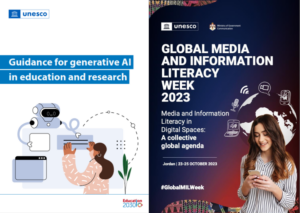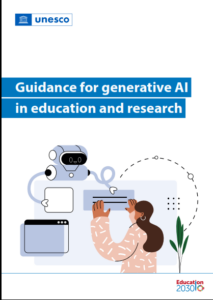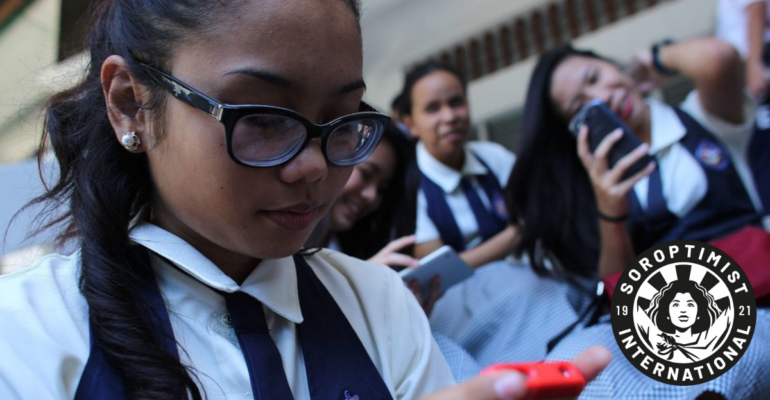Blog of Evelyne Para, SI UN Representative at UNESCO.
In the current period of tension and multiple global upheavals, marked by unresolved conflicts, the growing threat of climate change and economic turbulence, we are concerned about the many threats that are shaking societies today, particularly those arising from disinformation. Radio, television, computers, Internet and social networks have opened new educational horizons, but also created serious anxiety.
In this context, I had the chance to participate in two important events organised by UNESCO, in September and October 2023. I give you some interesting thoughts exchanged with the participants.

The First Digital Learning Week 2023
This new annual flagship UNESCO event on digital learning and transformation of education took place from 4 to 7 September 2023 at UNESCO headquarters in Paris.
Around 1000 participants from over 50 countries were brought together, including 17 ministers, international policy makers, educators, private sector partners, researchers and development agencies to jointly respond to the new dynamics around digital innovation and directing Technology to serve Education.
As we know, technological revolutions are a source of both hope and anxiety. During this week, the different interventions reflected all these nuances. The main objective of the event was to facilitate the productive exchange of ideas, experiences and practices in order to guide and leverage Technology for Education.
Introducing this Week, Stefania Giannini, Assistant Director-General for Education, delivered a comprehensive speech on UNESCO’s work to integrate new digital tools, including generative Artificial Intelligence (AI), in the education system.
Are innovations in the digital domain beneficial or harmful for schools? The answer is complex.
The appearance of new digital technologies is an opportunity. These innovations can help the most marginalised students, those with disabilities, or who belong to linguistic and cultural minorities. They can help personalise learning and create more flexible education systems. And they can be used to overcome geographic and temporal barriers to create immersive education, provided it is guided by the principles of inclusion, equity, quality and accessibility, particularly for people living in regions with limited resources, refugees, women and girls excluded from the education system in certain countries.
Despite everything, the dangers are real. The digital divide widens with each innovation. Globally, 31% of students have not had access to online classes during the Covid-19 pandemic. Misinformation and hate speech are spreading and online resources neglect 95% of languages currently spoken. Generative AI, capable of imitating the human ability to create text, images, videos, music and computer code, is even forcing us to redefine the specificity of human intelligence, which has repercussions on that we learn, how we learn and even why we learn.
So, how can we prepare youth for a society where humans and machines coexist, without undermining human intellect as we delegate certain cognitive functions? We cannot afford to indulge a generation in this experiment.
 It is for this reason that, in its Guide “Guidance for generative AI in education and research” designed to deal with the disruptions caused by these technologies, and presented on the occasion of this Digital Learning Week 2023, UNESCO calls for caution until regulatory frameworks, training of teaching staff and adapted school programs can protect our students and our education systems.
It is for this reason that, in its Guide “Guidance for generative AI in education and research” designed to deal with the disruptions caused by these technologies, and presented on the occasion of this Digital Learning Week 2023, UNESCO calls for caution until regulatory frameworks, training of teaching staff and adapted school programs can protect our students and our education systems.
Technology should in no way replace qualified teachers, who represent one of the pillars on which this transformation of education is based, because they support the development of their students, as individuals and citizens.
World Media and Information Literacy Week
The second event in which I had the chance to participate was “World Media and Information Literacy Week” which took place from 24 to 31 October 2023 at UNESCO Paris.
The advent of the internet and social media has revolutionised the way we inform, educate and organise, providing unprecedented possibilities for expression and access to information. However, the rise of misinformation and hate speech online has shown that we need to work harder to teach people of all ages, and especially young people, to think critically and click wisely in spaces online, as well to understand the algorithms and processes behind them. In other words, people must be given the means to acquire media and information literacy. Of course, this effort begins in the classroom.

“With the spread of rumors and the distortion of facts, the line between truth and falsehood is blurring. This undermines the very foundations of our societies and our democracies, endangering lives through the spread of false cures, the fueling of false theories such as the vaccine conspiracy, or even the spread of racism and hate speech. In this deluge of information, we need more points of reference and more rational thinking. And this is why media and information literacy is a key skill for educating 21st century citizens.”
These are the words made by Audrey Azoulay, Director General of UNESCO, at the opening of the Week.
This week made it possible to mobilise several stakeholders: representatives of governments, digital platforms, civil society, schools, libraries, young people and the media, with the aim of advancing a common approach. At the end of the work, the Recommendations underlined the importance of giving learners the means to:
- Know their rights online and respect the rights of others, such as the right to privacy, digital rights and other Human Rights such as freedom of expression and access to information.
- Being more critical about how they use information, digital technologies and media and thus become more resistant to hateful content and disinformation that fuels conflict and division.
- Developing more autonomy to protect yourself and others, and thus stay safe online.
- Appreciate how transparency and accountability of digital platforms and media can facilitate openness and dialogue in digital spaces.
- Know how to access information online and what ethical measures to take when access is blocked.
- Engage meaningfully in dialogue and promotion of equality and non-discrimination online – including gender equality – respecting the point of view of others while advocating for peace and inclusive digital spaces.

